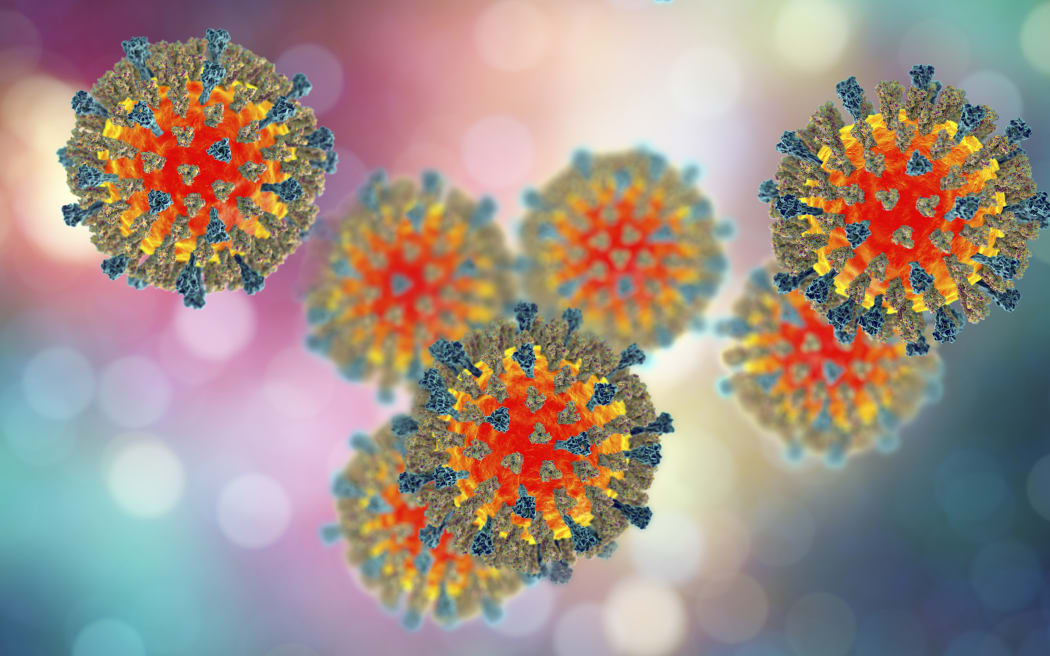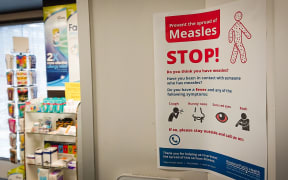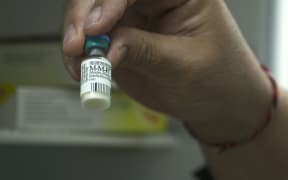
Measles viruses. 3D illustration showing structure of measles virus with surface glycoprotein spikes heamagglutinin-neuraminidase and fusion protein. Photo: 123RF
A Māori health provider in Counties Manukau says low immunisation rates among tamariki Māori is partly caused by Cyclone Gabrielle and Covid-19.
Immunisation rates for tamariki Māori in six regions, including Counties Manukau, Hawke's Bay, Lakes, Te Tai Rāwhiti, Waikato and the West Coast, are sitting at less than 69 percent.
The number of children becoming susceptible to measles is growing by about 1000 a month, according to public health experts.
The figure has been highlighted in a briefing paper by the Public Health Communication Centre, a group of leading doctors and public health researchers.
Turuki Health chief executive Te Puea Winiata said her organisation helped with the response to Cyclone Gabrielle but it meant putting measles immunisations on hold.
"A lot of the initiatives that had been planned for December through to the beginning of April to get people ready for all sorts of other immunisations all went out the window basically. So that delayed a lot of the work that could have been done during that time," Winiata said.
She said trying to increase the rates took a lot of planning and consistent and sustainable funding so they were able to run programmes.
"Most providers in our sector at the moment are concerned with measles and the epidemic that could happen as a result of that, so a lot of emphasis is being put on engaging with whānau, providing information, being opportunistic, doing outreach, community events. There's never really one silver bullet for this, a range of interventions."
She said to try and boost numbers, they had mobile services that could travel to whānau.
"We do quite a bit of outreach, we have a team that ring whānau, check in with how they're feeling about getting their children immunised, giving them information and making appointments and getting our team out there. Sometimes, transport is just a significant issue, particularly if you've got a number of young ones trying to get them on to public transport, it's challenging," Winiata said.
She emphasised it was important to tamariki Māori health for them to get immunised.
"It's [Measles] serious and can have long lasting effects , we actually want our tamariki to be well, to have immunisation for whooping cough, mumps as well as measles, all of that is really important to ensure their health and well-being not only for themselves but for their whānau.
She said getting the measles vaccination should be looked at from a holistic point of view.
"Immunisation and our support to prevent diseases like measles and other things are really critical, we've lost a lot of momentum because funding comes to an end and then we have to wait and restart our programme again. Sustainable funding is really important in this area for providers and also to provide a consistent service so when whānau are ready, we're ready to go as well," Winiata said.
Meanwhile, a public health doctor has warned a measles outbreak now could result in case number reaching six figures.
Oz Mansoor is part of the Public Health Communication Centre that is warning that the growing number of unimmunised children is increasing risk.
He said more than half a million people in New Zealand were now susceptible to measles.
"If measles comes into the country and starts spreading, we're at risk of this very large epidemic with tens if not 100,000 people affected with measles," Mansoor said.
"We know that in 2019 nearly a third of cases were hospitalised, so it's a serious disease that's preventable with a safe vaccine.
"We know that measles spreads primarily in primary schools and early childhood centres, where there's a lot of contact between children.
"Until recently, we've had really good immunity, particularly in the primary school age that has had helped prevent spread, and we're losing that."
The immunity gap is widest in children under eight.





